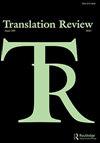The Iterative, Even Infinite
IF 0.3
3区 文学
0 LANGUAGE & LINGUISTICS
引用次数: 0
Abstract
The modes of creation and preservation of nineteenth-century Kurdish poetry reveal the fallacy and short-sightedness of the definitive and the singular. No text is static. Each text is many. Each text contains and requires communities. I have come to think of this as a terrific metaphor for the subtle truth of all text, even where a poet’s handwriting exists, and contemporary readers contend that they can verify the poet’s intent. If as translators, we treat each text, no matter its point of origin or host language, as dynamic rather than static, we humble ourselves about any one translation we may make. We open ourselves and our translations up to the strengths and contributions of others. Co-translation can continue becoming a practice born not of what we lack, but of what we are curious we can make when a translation begins in multiple perspectives. We help ourselves and our readers remember why the proliferation of translations for any one text remains continually necessary and exciting. Translators—all readers—can let go of the definitive in favor of the iterative, even infinite, process that is understanding. Over the last ten years, more than forty cotranslators and I have published over sixty poems, short stories, interviews, and book-length collections of Kurdish literature in English-language translation. Many of the authors we worked with had never before been translated into English. We collaborated because we both wanted and needed to work together: poetry—and all Kurdish literature, from horoscopes to theology, was poetry until the early twentieth century—demanded translators of various specialties working together. A single poem often included up to four languages (Arabic, Persian, Turkish, and Kurdish), with at least three different dialects of Kurdish (Kurmanji, Sorani, and Gorani) that have since diverged into distinct, at times mutually unintelligible, entities. Beyond that, these historical poets grew up in the Islamic educational system (at the time, the only one), so they drew heavily on the Islamic sciences, Islamic numerology, and nowobscure theology. To even begin to understand these poems was already a process of translation that took place between Kurdish speakers who had grown up in various dialects, with varying levels of Islamic education and varying understandings of the Kurdish, Arabic, Persian, and Turkish literary traditions. To bring these poems into English was yet another translation. And that specific act of translation, from Kurdish to English, even now has very few dictionaries or thesauruses. Each word we couldn’t find in a dictionary required we create a community that could agree on its meaning/s. For each poem, we built out an individuated glossary and integrated comments from multiple expert readers. Community was where we began. Community was where any attempt at translation had to begin. Each translation team thought through how much cultural translation they wanted to do, how many references they found themselves willing to let fade in favor of musicality or sense, how much sense they could let slide before losing an Englishlanguage reader who was likely unfamiliar with the poem’s context and, at worst, might hold severe prejudices against the poem’s originating context. Each team answered these questions differently and translated differently. We embraced what we called “dissenting translations,” which were the translations a team member might make completely on their own to show what they thought possible or what they would have wanted to do differently. Dissensus is community, not its antithesis. It never occurred to us to privilege any one cotranslator over another, as many translators have done over generations. There was no one “real” translator and certainly no collaborator who could be relegated to the role of uncredited “dictionary with legs.” Everyone was essential. TRANSLATION REVIEW 2023, VOL. 115, NO. 1, 23–34 https://doi.org/10.1080/07374836.2023.2179314迭代,甚至无限
19世纪库尔德诗歌的创作和保存模式揭示了确定性和单一性的谬误和短视。没有文本是静态的。每个文本都是很多的。每个文本都包含并要求社区。我认为这是对所有文本的微妙真相的一个极好的隐喻,即使诗人的笔迹存在,当代读者也声称他们可以证实诗人的意图。如果作为译者,我们对待每一篇文本,无论其来源或宿主语言如何,都是动态的,而不是静态的,那么我们就会对我们所做的任何一项翻译感到谦卑。我们将自己和我们的翻译开放给他人的优势和贡献。共同翻译可以继续成为一种实践,不是因为我们缺乏什么,而是因为当翻译从多个角度开始时,我们对自己能做些什么感到好奇。我们帮助我们自己和我们的读者记住为什么任何一个文本的翻译的激增仍然是必要的和令人兴奋的。译者——所有的读者——都可以放弃确定性,转而选择迭代的、甚至是无限的理解过程。在过去的十年里,我和四十多名合作者出版了六十多首诗歌、短篇小说、访谈和以英语翻译的库尔德文学书籍。我们合作过的许多作家以前从未被翻译成英文。我们合作是因为我们都希望并且需要一起工作:诗歌——以及所有库尔德文学,从占星术到神学,直到20世纪初都是诗歌——需要不同专业的翻译人员一起工作。一首诗通常包含多达四种语言(阿拉伯语,波斯语,土耳其语和库尔德语),至少有三种不同的库尔德方言(库尔曼吉语,索拉尼语和戈拉尼语),这些方言后来分化成不同的,有时相互难以理解的实体。除此之外,这些历史上的诗人都是在伊斯兰教育体系中长大的(当时是唯一的),所以他们大量地借鉴了伊斯兰科学、伊斯兰数字命理学,以及现在鲜为人知的神学。要开始理解这些诗歌已经是一个翻译的过程,这个过程发生在说库尔德语的人之间,他们在不同的方言中长大,接受过不同程度的伊斯兰教育,对库尔德语、阿拉伯语、波斯语和土耳其文学传统的理解也各不相同。把这些诗译成英语又是一种翻译。这种从库尔德语到英语的具体翻译,直到现在也很少有词典或同义词库。我们在字典中找不到的每个单词都需要我们创建一个能够就其含义达成一致的社区。对于每首诗,我们都建立了一个个性化的词汇表,并整合了多位专家读者的评论。社区是我们开始的地方。社区是任何翻译尝试必须开始的地方。每个翻译团队都仔细考虑了他们想要做多少文化翻译,他们发现自己愿意让多少参考文献淡化以支持音乐性或感觉,在失去可能不熟悉诗歌上下文的英语读者之前,他们可以让多少感觉流失,最坏的情况是,他们可能对诗歌的原始语境有严重的偏见。每个团队对这些问题的回答不同,翻译也不同。我们接受了所谓的“不同意见的翻译”,即团队成员可能完全独立完成的翻译,以显示他们认为可能的或他们想要做的不同的翻译。不同意见是共同体,而不是它的对立面。我们从来没有想过要像许多翻译家几代以来所做的那样,给任何一个共同翻译家以特权。没有一个“真正的”翻译家,当然也没有一个合作者可以被贬为没有署名的“有腿的词典”。每个人都必不可少。翻译评论2023,第115卷,第115期。1, 23-34 https://doi.org/10.1080/07374836.2023.2179314
本文章由计算机程序翻译,如有差异,请以英文原文为准。
求助全文
约1分钟内获得全文
求助全文

 求助内容:
求助内容: 应助结果提醒方式:
应助结果提醒方式:


